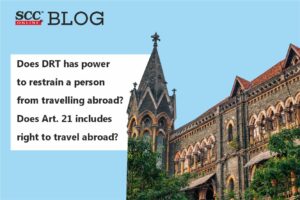Bombay High Court: Expressing that the right to travel abroad has been spelt out from the expression “personal liberty” in Article 21 of the Constitution, A.S. Chandurkar and Amit Borkar, JJ., observed that, the provisions under the Recovery of Debts Due to Banks and Financial Institutions Act, 1993, do not impliedly confer such powers on the Debt Recovery Tribunal to restrain a person from travelling abroad.
Issue
The instant petition raised an important question with regard to the interpretation of Article 21 of the Constitution of India as to whether the expression “personal liberty” occurring in the said Article includes the right to travel abroad?
Whether refusal to grant permission to travel abroad results in the infringement of Article 21 of the Constitution of India?
Background
The petitioner had challenged the order passed by the Debt Recovery Tribunal refusing to grant permission to travel abroad for a limited time to attend the marriage of the petitioner’s sister-in-law.
Analysis, Law and Decision
Article 21 of the Constitution of India
“21. No person shall be deprived of his life or personal liberty except according to procedure established by law.”
While stating that it is a well settled that the expression “personal liberty” includes right of a citizen to travel abroad and return to the home country without any impediment, direct or indirect. The expression “personal liberty” has not been used in the restricted sense of freedom from arrest and detention but had been used in a much wider sense.
The above-said right emanates from the freedom of a person and the right to travel abroad and return to the country without impediment, direct or indirect, is contained in the expression “personal liberty” occurring in Article 21 of the Constitution.
“…Law in this Article means the law enacted by a competent Legislature.”
Further, the Bench added that, the mandate of Article 21 is that the deprivation of “personal liberty” has to be “according to procedure established by law.”
Elaborating further, the High Court observed that,
The right to travel abroad is right distinct and separate from the right of freedom of movement in a foreign country.
The right to travel abroad of a citizen of India was considered in the Supreme Court in Maneka Gandhi v. Union of India, (1978) 1 SCC 248.
Additionally, the Court referred to Sub-Section 12, 13(A), 17 and 18 of Section 19 of the Recovery of Debts Due to Banks and Financial Institutions Act, 1993 and stated that the Tribunal is not conferred with specific power to restrain a person from leaving the country.
In Court’s opinion, Section 22 confers the procedural right to regulate proceedings before it.
“In the absence of a specific provision conferred on the Debt Recovery Tribunal by statute, the Debt Recovery Tribunal has no power to restrain a citizen from travelling abroad, particularly when the said right has been recognised as a facet of Article 21 of the Constitution of India.”
High Court added that the rights of respondent 1 will sufficiently protect the rights of respondent 1 to recover the amount of dues from the petitioner.
While concluding the matter, the Bench held that the order refusing permission to travel abroad has been made in contravention of the provisions of Article 21 of the Constitution and is violative of the right guaranteed to the petitioner under Article 21.
Further, the State had not made any law or provision in the said Act seeking to deprive or regulate the right of a person to travel abroad.
Hence, the order was set aside.
“…the purpose of depriving or regulating the right of a person to travel abroad, it is necessary to have a procedure established by law enacted by a competent Legislature in the said act or by way of independent legislation which is absent herein.”
In view of the above, the Debt Recovery Tribunal had no power to restrain a person from travelling abroad in the absence of specific powers to that effect. [Anurag v. Bank of India, 2022 SCC OnLine Bom 1160, decided on 7-6-2022]
Advocates before the Court:
Mr Akshay Naik a/w Mr D.V. Chauhan and Mr C.J. Dhruv, Advocates for Petitioner.
Mr A. T. Purohit, Advocate for Respondent No.1.
Mr D. Gupta, Advocate for Respondent No.2(Official Liquidator).

